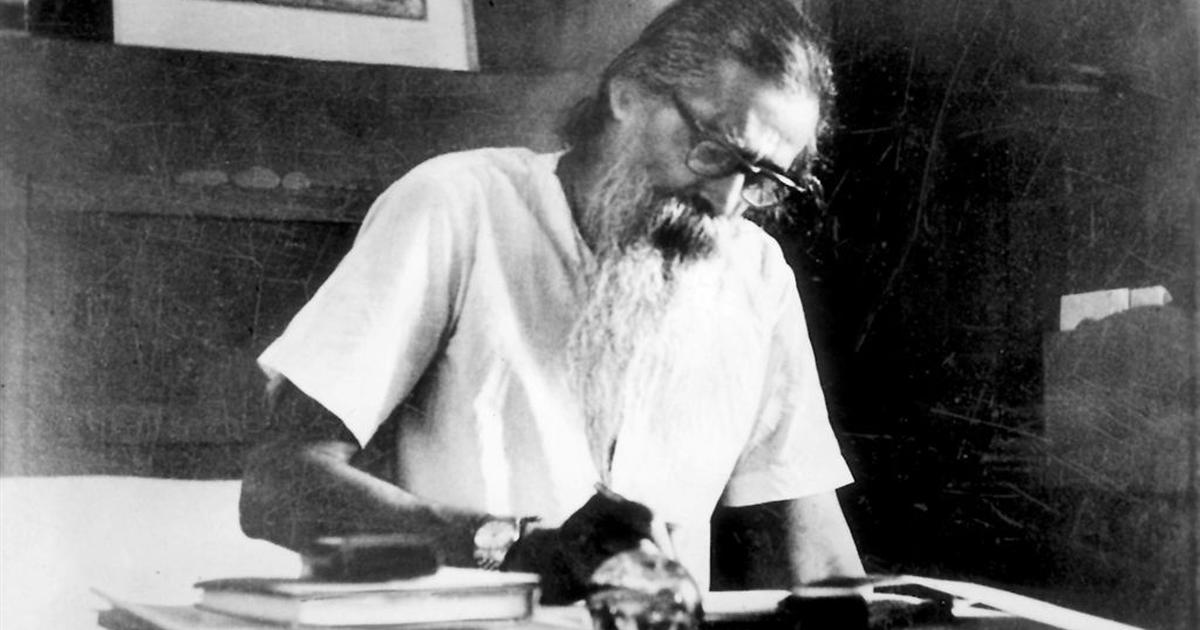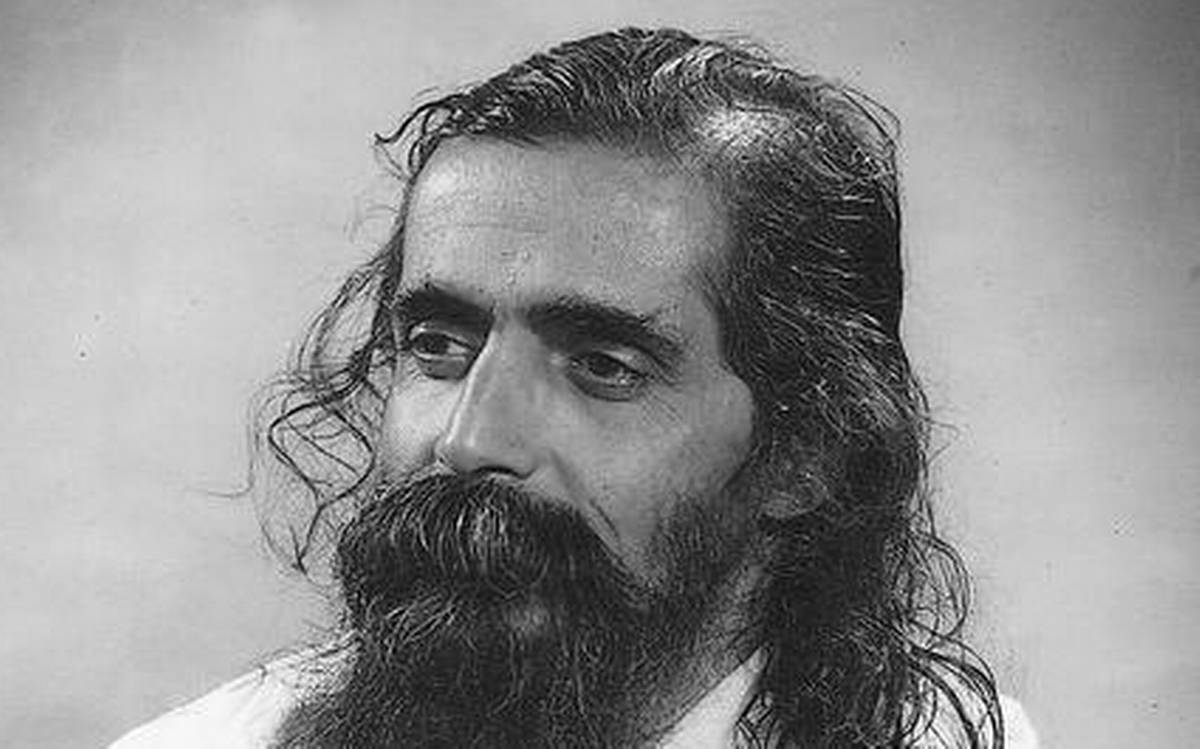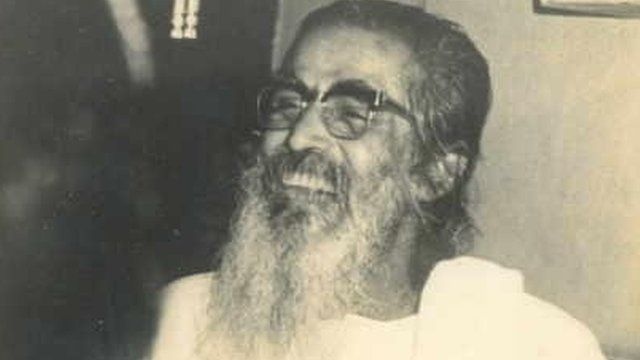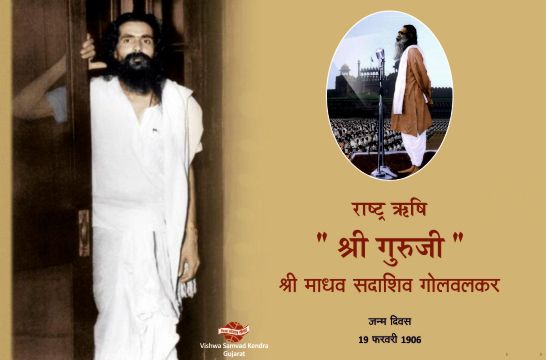Guruji (M.S. Golwalkar) on Education
M. S. Golwalkar had a strong belief in the importance of education. He believed that education should not only focus on imparting knowledge and skills, but also on character building and the development of the whole person.

M. S. Golwalkar, also known as Madhav Sadashiv Golwalkar, Fondly called as "Guruji" was a prominent leader of the Rashtriya Swayamsevak Sangh (RSS). He served as the second sarsanghchalak (leader) of the RSS from 1940 to 1973. In his writings, Golwalkar emphasized the concept of svayam sevak (self-serving volunteer), which refers to individuals who dedicate themselves to serving their community and nation without expecting anything in return. He believed that the development of the individual and society were closely connected and that the svayam sevak should strive to become a "complete human being" through disciplined physical, mental, and spiritual training.
Guruji on Character Building
Guruji He emphasized the importance of character-building in his writings and speeches. He believed that the development of an individual's character was crucial for the overall development of society.
In his book "Bunch of Thoughts", he writes that the building of character should be the primary aim of education. He believed that it was important for individuals to develop a strong moral and ethical foundation, which would guide their actions and decisions. He believed that an individual with strong character would be able to resist negative influences and stand up for what is right.
He also emphasized the importance of self-discipline, hard work, and self-control in character building. He believed that individuals should strive to control their thoughts, emotions, and actions, in order to achieve a higher level of self-awareness and self-mastery.
Guruji also believed that character-building was not just an individual effort, but a collective one. He believed that society should work together to create an environment that fosters the development of strong character in individuals.

Guruji's writings
Guruji Golwalkar was a prominent leader of the Rashtriya Swayamsevak Sangh (RSS) and a prolific writer. He wrote several books and articles on various topics, including Hindu nationalism ideology, Indian culture and tradition, and the role of the individual in society. Some of his most notable works include:
- "We or Our Nationhood Defined" (1939) - In this book, Guruji elaborates on the concept of "Hindutva" (Hinduness) and defines the Indian nation as consisting of people of Hindu culture and heritage, regardless of their religious beliefs.
- "Bunch of Thoughts" (1946) - This book is a collection of Guruji's speeches and articles, in which he expounds on various topics such as national unity, character building, and the role of the individual in society.
- "Shakha" (1948) - This book explains the concept of the "shakha" (branch), which is the basic unit of the RSS. In this book, Guruji explains the importance of physical, mental, and spiritual training in the shakha and its role in character building.
- "A Guide to the Bodhi" (1953) - This book is a collection of Guruji's speeches on Buddhism and its relevance to modern society.
- "The Legacy of Freedom" (1958) - In this book, Guruji reflects on India's struggle for independence and the need for the preservation of the country's freedom and cultural heritage.
These books and speeches of Guruji Golwalkar are considered an important source of inspiration for many RSS followers and also had a significant impact on the Hindu nationalist movement in India.

M. S. Golvalkar on Education
M. S. Golwalkar had a strong belief in the importance of education. He believed that education should not only focus on imparting knowledge and skills, but also on character building and the development of the whole person.
In his book "Bunch of Thoughts", he wrote that education should aim at the "all-round development of the child's personality" and that it should be based on the principle of "Vasudhaiva Kutumbakam" meaning "the world is one family". He believed that education should foster a sense of national pride and a commitment to serving the nation.
Guruji also believed that education should be based on the principles of Indian culture and tradition and that it should help students understand and appreciate their cultural heritage. He believed that education should encourage students to develop a strong moral and ethical foundation, which would guide their actions and decisions.
He also emphasized the importance of physical education and discipline in character building. He believed that individuals should strive to control their thoughts, emotions, and actions, in order to achieve a higher level of self-awareness and self-mastery.
Overall, Guruji Golwalkar's views on education were heavily influenced by his belief in the importance of character building and national pride, as well as his belief in the importance of India's cultural heritage.

Guruji on Gurukul Education
Guruji had a strong belief in the value of traditional Indian education, particularly in the form of gurukul education. Gurukul education is an ancient system of education in which students lived and studied with their teachers, known as gurus, in a residential setting.
In his book "Bunch of Thoughts", Guruji wrote that gurukul education is an ideal way to inculcate traditional values and culture in students and that it can help to create a strong sense of national pride and unity. He believed that the gurukul system fosters a close relationship between the teacher and student and allows for the development of a strong moral and ethical foundation in students.
Guruji also believed that the gurukul system of education is more effective in character building and personality development as compared to the modern education system. He believed that gurukul education emphasizes on all-around development of a student, including physical, mental, and spiritual aspects.
Guruji also believed that gurukul education would help to preserve and promote India's cultural heritage, which he believed was under threat from the influence of Western education. He believed that the gurukul system was more in line with the Indian way of life, and that it would help to create a generation of Indians who were proud of their cultural heritage.
In conclusion, Guruji Golwalkar believed that the traditional Indian education system, especially the gurukul system, was an effective way to develop strong, well-rounded individuals with a deep sense of national pride and commitment to their cultural heritage.

On Physical training
Guruji placed a strong emphasis on the importance of physical training in the development of an individual. He believed that physical training was crucial for the overall development of the individual and that it was an essential aspect of character building.
In his book "Shakha", Guruji wrote that physical training should be an integral part of education and that it should aim at the "all-round development of the child's personality." He believed that physical training would help to inculcate discipline, self-control, and a sense of responsibility in individuals.
Guruji also believed that physical training was necessary for the preservation of national security and the protection of the country. He believed that a physically fit and disciplined population would be better equipped to defend the nation in times of crisis.
He also believed that physical training should be based on the principles of Indian culture and tradition and that it should help students understand and appreciate their cultural heritage. He believed that physical training should encourage students to develop a strong moral and ethical foundation, which would guide their actions and decisions.
In conclusion, Guruji Golwalkar believed that physical training was an essential aspect of education and character building and that it should be an integral part of the development of the individual and the nation. He believed that it would help to create a physically fit, disciplined, and morally upright population, who will be better equipped to defend their country and preserve their cultural heritage.

Guruji's Story Book for Children
Guruji Golwalkar, the second Sarsanghchalak of the Rashtriya Swayamsevak Sangh (RSS), wrote several books for children which were designed to instill a sense of national pride and duty in the young readers. One of the most well-known books he wrote for children is "Shri Guruji: A Life" which was a biography of Guruji Golwalkar himself, told in a storybook format.
This book is a biography of Guruji told in story format, it covers his early years, his education, his association with the RSS, and the various roles he played in the organization. It also covers his philosophical views, and his emphasis on character-building, education, and cultural heritage.
The book is written in a simple language that is easy for children to understand, and it is illustrated with colorful pictures that help to bring the story to life. The book aims to inspire children to emulate Guruji's example and to develop a strong sense of national pride and duty.
Guruji's other books for children include "Bapu" (about Mahatma Gandhi), "Veer Savarkar" (about Vinayak Damodar Savarkar), and "Swatantryaveer Savarkar" (about Veer Savarkar) which were written by the same objective of inspiring young readers to appreciate their cultural heritage and to develop a sense of national pride and duty.
In conclusion, Guruji Golwalkar wrote several books for children that aimed to instill a sense of national pride and duty in young readers. "Shri Guruji: A Life" is one of the most well-known books he wrote for children, which was a biography of Guruji Golwalkar himself, told in a storybook format.

Guruji told stories to the children
Guruji is known to have often told stories to children as part of his efforts to instill a sense of national pride and duty in young minds. He believed that stories were an effective way to communicate important values and ideas to children and that they could help to inspire and motivate them.
Guruji would often tell stories from Indian mythology and history that highlighted the importance of courage, sacrifice, and duty. These stories were designed to help children understand the importance of these values and to develop a strong sense of national pride.
In addition to stories from mythology and history, Guruji would also tell stories from his own life, which were designed to inspire children to emulate his example. He would often tell stories about his own struggles and challenges, and how he overcame them through discipline, hard work, and perseverance.
Guruji also believed that stories were a powerful tool for character-building and personality development. He believed that stories could help children to understand and appreciate the importance of moral and ethical values and to develop a strong sense of self-discipline and self-control.
In conclusion, Guruji Golwalkar believed that stories were an effective way to communicate important values and ideas to children and that they could help to inspire and motivate them. He would often tell stories from Indian mythology and history, as well as from his own life, which were designed to help children understand the importance of courage, sacrifice, and duty, and to develop a strong sense of national pride and moral values.
Guruji ki kahaniyan Book
Guruji Golwalkar, have written a book titled "Guruji Ki Kahaniyan" (Stories of Guruji) which is a collection of stories that he used to tell to children. These stories are designed to instill a sense of national pride and duty in young minds and to help children understand and appreciate the importance of moral and ethical values.
The book "Guruji Ki Kahaniyan" is a collection of stories from Indian mythology and history, as well as from Guruji's own life. The stories are designed to help children understand the importance of values such as courage, sacrifice, and duty, and to develop a strong sense of national pride.
The stories in the book are written in a simple language that is easy for children to understand, and they are illustrated with colorful pictures that help to bring the stories to life. The book is designed to be read by parents, teachers, and other adults to children, and it is an effective tool for character-building and personality development.
The stories in the book are designed to help children understand and appreciate the importance of moral and ethical values. They are also intended to inspire children to emulate Guruji's example and to develop a strong sense of self-discipline and self-control.
In conclusion, Guruji Golwalkar wrote a book titled "Guruji Ki Kahaniyan" which is a collection of stories that he used to tell to children. These stories are designed to instill a sense of national pride and duty in young minds and to help children understand and appreciate the importance of moral and ethical values. A book is an effective tool for character-building and personality development.

